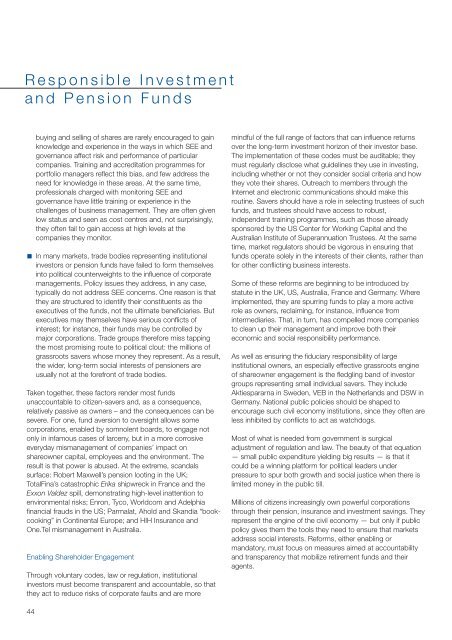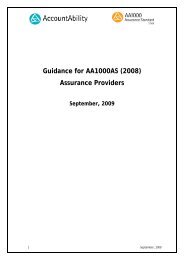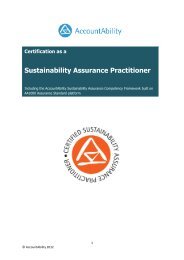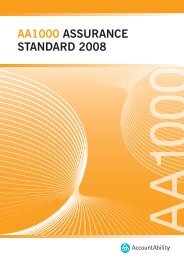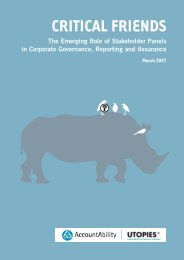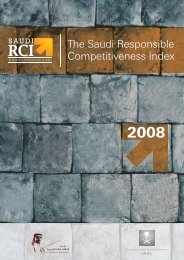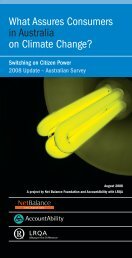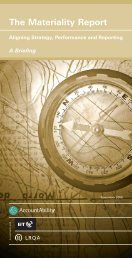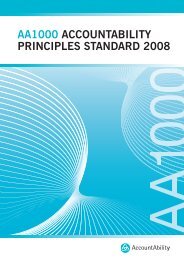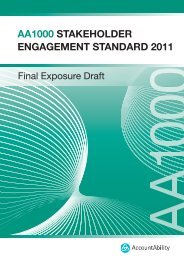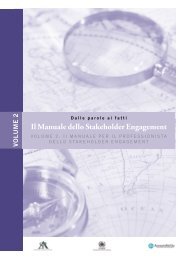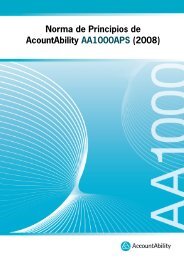Mainstreaming Responsible Investment - AccountAbility
Mainstreaming Responsible Investment - AccountAbility
Mainstreaming Responsible Investment - AccountAbility
You also want an ePaper? Increase the reach of your titles
YUMPU automatically turns print PDFs into web optimized ePapers that Google loves.
<strong>Responsible</strong> <strong>Investment</strong><br />
and Pension Funds<br />
buying and selling of shares are rarely encouraged to gain<br />
knowledge and experience in the ways in which SEE and<br />
governance affect risk and performance of particular<br />
companies. Training and accreditation programmes for<br />
portfolio managers reflect this bias, and few address the<br />
need for knowledge in these areas. At the same time,<br />
professionals charged with monitoring SEE and<br />
governance have little training or experience in the<br />
challenges of business management. They are often given<br />
low status and seen as cost centres and, not surprisingly,<br />
they often fail to gain access at high levels at the<br />
companies they monitor.<br />
In many markets, trade bodies representing institutional<br />
investors or pension funds have failed to form themselves<br />
into political counterweights to the influence of corporate<br />
managements. Policy issues they address, in any case,<br />
typically do not address SEE concerns. One reason is that<br />
they are structured to identify their constituents as the<br />
executives of the funds, not the ultimate beneficiaries. But<br />
executives may themselves have serious conflicts of<br />
interest; for instance, their funds may be controlled by<br />
major corporations. Trade groups therefore miss tapping<br />
the most promising route to political clout: the millions of<br />
grassroots savers whose money they represent. As a result,<br />
the wider, long-term social interests of pensioners are<br />
usually not at the forefront of trade bodies.<br />
Taken together, these factors render most funds<br />
unaccountable to citizen-savers and, as a consequence,<br />
relatively passive as owners – and the consequences can be<br />
severe. For one, fund aversion to oversight allows some<br />
corporations, enabled by somnolent boards, to engage not<br />
only in infamous cases of larceny, but in a more corrosive<br />
everyday mismanagement of companies’ impact on<br />
shareowner capital, employees and the environment. The<br />
result is that power is abused. At the extreme, scandals<br />
surface: Robert Maxwell’s pension looting in the UK;<br />
TotalFina’s catastrophic Erika shipwreck in France and the<br />
Exxon Valdez spill, demonstrating high-level inattention to<br />
environmental risks; Enron, Tyco, Worldcom and Adelphia<br />
financial frauds in the US; Parmalat, Ahold and Skandia “bookcooking”<br />
in Continental Europe; and HIH Insurance and<br />
One.Tel mismanagement in Australia.<br />
Enabling Shareholder Engagement<br />
Through voluntary codes, law or regulation, institutional<br />
investors must become transparent and accountable, so that<br />
they act to reduce risks of corporate faults and are more<br />
mindful of the full range of factors that can influence returns<br />
over the long-term investment horizon of their investor base.<br />
The implementation of these codes must be auditable; they<br />
must regularly disclose what guidelines they use in investing,<br />
including whether or not they consider social criteria and how<br />
they vote their shares. Outreach to members through the<br />
Internet and electronic communications should make this<br />
routine. Savers should have a role in selecting trustees of such<br />
funds, and trustees should have access to robust,<br />
independent training programmes, such as those already<br />
sponsored by the US Center for Working Capital and the<br />
Australian Institute of Superannuation Trustees. At the same<br />
time, market regulators should be vigorous in ensuring that<br />
funds operate solely in the interests of their clients, rather than<br />
for other conflicting business interests.<br />
Some of these reforms are beginning to be introduced by<br />
statute in the UK, US, Australia, France and Germany. Where<br />
implemented, they are spurring funds to play a more active<br />
role as owners, reclaiming, for instance, influence from<br />
intermediaries. That, in turn, has compelled more companies<br />
to clean up their management and improve both their<br />
economic and social responsibility performance.<br />
As well as ensuring the fiduciary responsibility of large<br />
institutional owners, an especially effective grassroots engine<br />
of shareowner engagement is the fledgling band of investor<br />
groups representing small individual savers. They include<br />
Aktiespararna in Sweden, VEB in the Netherlands and DSW in<br />
Germany. National public policies should be shaped to<br />
encourage such civil economy institutions, since they often are<br />
less inhibited by conflicts to act as watchdogs.<br />
Most of what is needed from government is surgical<br />
adjustment of regulation and law. The beauty of that equation<br />
— small public expenditure yielding big results — is that it<br />
could be a winning platform for political leaders under<br />
pressure to spur both growth and social justice when there is<br />
limited money in the public till.<br />
Millions of citizens increasingly own powerful corporations<br />
through their pension, insurance and investment savings. They<br />
represent the engine of the civil economy — but only if public<br />
policy gives them the tools they need to ensure that markets<br />
address social interests. Reforms, either enabling or<br />
mandatory, must focus on measures aimed at accountability<br />
and transparency that mobilize retirement funds and their<br />
agents.<br />
44


